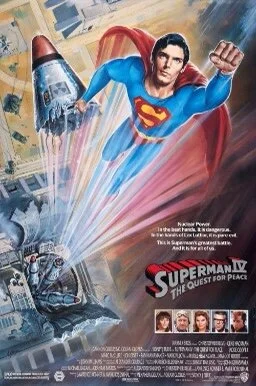Director: Sidney J. Furie
Cast: Christopher Reeve, Gene Hackman, Margot Kidder, Mariel Hemingway
Have I Seen it Before: A couple of times, mystifyingly.
Did I Like It: Oh, boy... Where to start? Before we get into any of the myriad details, here’s the big, unfortunately reality of this film:
It is worse than the universally reviled Batman & Robin (1997).
Yes, Batman & Robin is a mostly wrong-headed*, somewhat cheap affair, but it is at least a complete film, which undeniably has a point of view and the full support of its studio at the time.
Superman IV isn’t even finished. Some of the most baffling editing choices exist in this film, and the special effects are nearly uniformly awful. There is one shot of Superman (Reeve, doing his best here, but even some of the pristine sense of the borders between Clark Kent and the Man of Steel are gone) flying toward the camera that is used at least ten times. It is such a terribly rendered process shot, made all the worse by the fact that I am reasonably sure it was actually shot for Superman III (1983).
There have been some disappointing big-franchise films in recent years—Star Wars: Episode IX: The Rise of Skywalker (2019) and Justice League (2017) come to mind—but anyone (including me) who has complained about those films needs to sit through this thing and witness just how far a franchise can fall. In Superman (1978), we believed a man could fly. Here, I still can’t quite bring myself to believe that the studio actually released this in theaters. Fantastic Four (1994) was never intended to be released, and it still has a touch of movie magic to it.
There’s a temptation to say that the story might be able to rise above the production shortcomings, but I don’t buy that argument much. Reeve’s passion for nuclear disarmament fitfully comes through in a couple of scenes, but the rest of the film is wall-to-wall b-movie cliche, punctuated by two of the singularly most baffling moments in cinematic history.
The film spends a sequence trying to recreate the magic of Superman and Lois Lane’s (Margot Kidder, walking through the film in a daze, which makes her seem like the only person in the production who knows whats going on) fly through the air in the original film. To do so, the film retcons the “memory-wipe kiss” from Superman II (1980) (admittedly, one of the weaker parts of that film), indicating the memory-wipe didn’t work and says Lois just chose not to say anything about her knowledge of Superman’s identity. They fly. Can You Read My Mind? The whole bit. Although it is, obviously, much worse. They land. Then Superman kisses her and wipes her memory again. It’s a staggeringly bad choice, and I have a hard time believing that at least some version of this fumble-to-end-all-fumbles didn’t appear in the script.
This all culminates in Superman’s final battle with Nuclear Man (voiced by Gene Hackman, who you can begin to sense is starting his fifteen year journey to not wanting to be a movie actor anymore, but physically performed by Mark Pillow, who I believe was never heard from again) where they play a little tug of war in outer space with seemingly mortal human Lacy Warfield (Mariel Hemingway). She breathes fine during the whole event, after which Superman takes her... somewhere in the vicinity of the planet Earth, after which the character is never heard from again. Ed Wood would have stopped that thinking in its tracks.
But then again, that scene could be related to the editing. Maybe the space sequences were meant to take place within Earth’s atmosphere, and more lost background plates are at play here...
You know it’s a bad film when you can never quite tell whether the script or the complete lack of production values are what is completely obliterating the experience. In some reviews for films I didn’t care for, I try to look for some bright spot, or at least some worse film to compare it to and put everything in perspective. Unfortunately, the film I often reach for in those comparisons is Superman IV: The Quest For Peace. It is, without a doubt, the worst superhero film ever made.
*It is often unfairly maligned as a gay movie, and if that weren’t unfair to begin with, but I’ve had a revelation recently that it has been more formative for LGBTQ people of my generation growing up than I ever would have thought.

